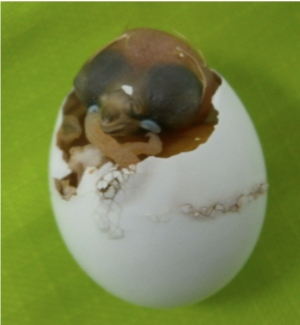Prenatal acoustic programming of development in birds
Mylene Mariette
Doñana Biological Station, Spain and Deakin University, Australia
Developmental plasticity is a key process through which the early environment shapes individuals’ phenotype by modulating development. Hormones, nutrients and other chemical compounds are notably very well-known for affecting development, including prenatally. The developmental impact of sound, however, has only recently been realised. I will review literature across taxa to show the strong impact of both natural and artificial prenatal sounds on developmental plasticity. Across oviparous taxa, sounds and vibrations affect hatching time and may synchronise sibling development, with consequences for later life-stages. In birds, prenatal sounds can also provide anticipatory cues to embryos on postnatal conditions and adaptively direct development. Notably, in the desert-adapted zebra finch, parents prepare their offspring for hot conditions by producing heat-calls during incubation in the heat. Such prenatal acoustic experience alone is capable of altering developmental trajectories and affecting individuals’ behaviour and physiology, including until adulthood. While developmental sensitivity to prenatal sounds can bring adaptive advantages, it also makes developing young susceptible to anthropogenic noise, which can have a large detrimental impact on development and long-term fitness. Overall, the evidence suggests that the impact of prenatal soundscape on development is far more profound than previously acknowledged. I will conclude by suggesting potential mechanistic pathways through which acoustic developmental programming may occur, based on neurological and physiological evidence. I hope that this synthesis will stimulate further collaborative research on the fascinating effect of soundwaves on organisms.










You must be logged in to post a comment.